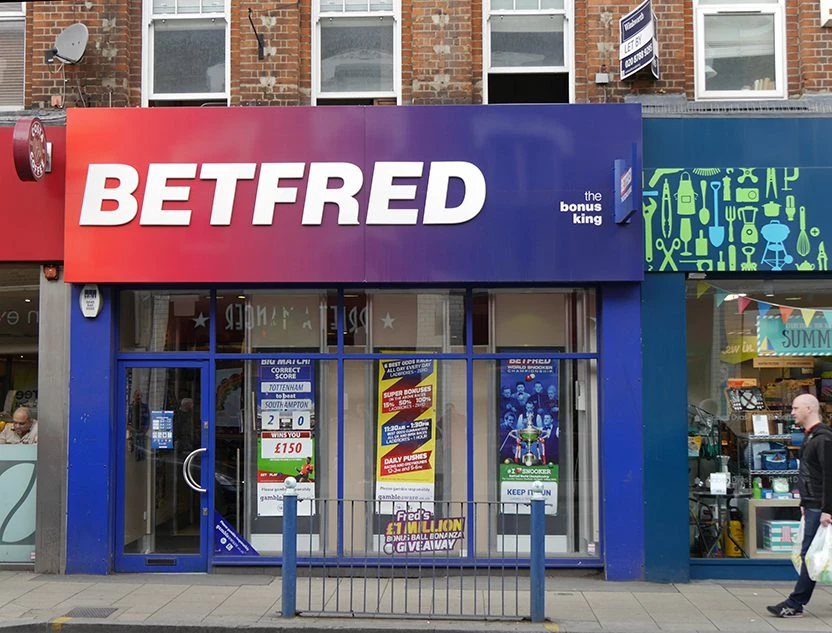Betfred ordered to pay £3.25m over GB failings

The operator will make the payment in lieu of a financial penalty and as part of a regulatory settlement with the Commission.
A Commission-led investigation and subsequent regulatory review uncovered a series of failings at Betfred between January 2021 and December 2022.
Failings included the implementation of AML policies, procedures and controls, as well as deficiencies in social responsibility policies, procedures, controls and practices.
Social responsibility failings
Setting out some of Betfred’s social responsibility failings, these included insufficient controls to protect new players. The Commission also noted Betfred failed to monitor high velocity spend and duration of play, exposing customers to the risk of substantial losses without safer gambling interactions.
Betfred was also found to have made assumptions players were not at risk of harm because they were winning customers. In one case, the operator failed to carry out safer gambling interactions on a customer who staked £517,499 in two months.
The Commission also noted a lack of evidence of evaluation of the effectiveness of individual user interactions. In addition, there was a lack of record keeping limiting the effectiveness of future interactions.
AML failings
Turning to AML, the Commission highlighted poor record keeping and that financial alert threshold were set too high.
Meanwhile, the regulator said Betfred failed to consistently obtain appropriate ‘know your customer’ (KYC) identification and source of funds (SoF) documentation from customers when thresholds were met.
In addition, Betfred was found to have placed undue reliance on open-source information. The Commission said it should have taken further steps to corroborate customers’ SoF information.
Breach – licence condition 12.1.1 (1)
Going into further detail, the Commission also set out specific licence breaches. The first was licence condition 12.1.1 (1), which requires an assessment on the risk of a business being used for terrorist financing and money laundering.
The regulator said Betfred did not take into account its latest guidance, nor demonstrate all risks to its business were considered. This included third party suppliers, payment providers and processors and customers using pre-paid cards.
Also with this condition, Betfred failed to detail risks and countermeasures in place to monitor customer transactions across multiple licensed betting offices, products and platforms in order to mitigate any ML potential.
Breach – licence condition 12.1.1 (2 and 3)
The Commission also flagged paragraphs 2 and 3 of the licence condition 12.1.1. Paragraph 2 relates to having the appropriate policies, procedures and controls to prevent money laundering and terrorist financing. Paragraph 3 references the need to keep these policies up to date.
The regulator said that while there was no evidence of criminal spend, Betfred breached the licence condition.
Examples of breaches included weaknesses and shortcomings in policies and procedures, as well as their implementation. The regulator flagged poor record keeping and that financial alerts were too high, giving one example of player who lost £61,000 in four months with no action being taken
Concerns were also noted on Betfred obtaining KYC and SoF information when thresholds were met. In one case, a player hit the AML trigger of £250,000 staked in 365 days, but ID was only requested after a 10-day delay.
Some players were also able to stake large amount without Betfred undertaking appropriate KYC checks. One user staked and lost £72,000 in nine months, while another spent £429,222 and lost £120,353 in 11 months.
Breach – Paragraph 1 and 2 of SRCP 3.4.1 (Customer Interaction)
The Commission also noted breaches of paragraphs 1 and 2 of Social Responsibility Code Provisions (SRCP) 3.4.1. Paragraph 1 requires licensees to interact with users to minimise the risk of gambling harms, while paragraph 2 relates to referring to Commission guidance on the issue.
According to the regulator Betfred had insufficient controls to protect new users, while it made assumptions customers were not at risk as they were winning.
In one case, a player staked £517,499 between 21 March 2022 and 18 May 2022. As he was a professional poker player and in a winning position of £8,585 in the period, it was assumed he was not at risk.
Betfred did not always interact with players at risk of harm early enough in their journey, while interactions carried out were not always effective.
One player played for five months and deposited £337,029 with a loss of £19,336. He was contacted 12 times and at each occasion was noted to be happy with his spending levels. However, the Commissions said at some interactions, he demonstrated signs of potential harms such as placing large bets.
Finally, the Commission noted a lack of evidence of evaluation of the effectiveness of user interactions, as well as a lack of record keeping. This, it said, limited the effectiveness of future interactions.
Case conclusion
The Commission reached a regulatory settlement with Betfred, which runs 1,750 betting shops in Britain as well as online gambling.
This featured the £3.25m payment, including a divestment of £1.05m. Betfred also agreed to cover the Commissions investigative costs, as well as for details of the case to be published.
“In recent years there’s been a public focus on online gambling but this case illustrates how important it is for us to continue our drive to raise standards across the whole industry,” the Commission’s executive director of operations, Kay Roberts, said.
“Gambling is a legitimate leisure activity enjoyed safely by millions but it is vital that every single operator – either online or offline – has in place effective safeguards to prevent harm or crime.”
Betfred is the latest operator to reach a regulatory settlement with the Commission over social responsibility and AML failings. Last month, Videoslots agreed to pay £2.0m, while in March, William Hill Group was ordered to pay a record £19.2m.
In addition, earlier this month, Star Racing was fined £594,000 for social responsibility and AML failings.
